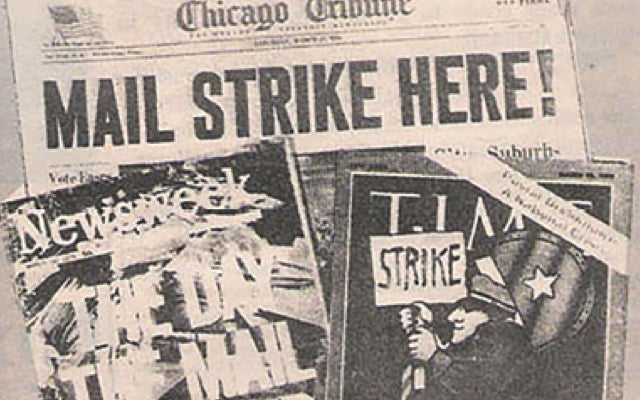
March 18, 1970: Postal Workers Strike
History Site
The first mass work stoppage in the 195-year history of the Postal Service began on March 18, 1970, with a walkout of letter carriers in Brooklyn and Manhattan who were demanding better wages.

The first mass work stoppage in the 195-year history of the Postal Service began on March 18, 1970, with a walkout of letter carriers in Brooklyn and Manhattan who were demanding better wages.
Ultimately, 210,000 (in 30 cities) of the nation’s 750,000 postal employees participated in the wildcat strike.
The first mass work stoppage in the 195-year history of the Postal Service began on March 18, 1970, with a walkout of letter carriers in Brooklyn and Manhattan who were demanding better wages.
Once called “the strike heard round the world,” the first major labor dispute in the U.S. auto industry ended after General Motors signed a contract with the United Auto Workers Union on February 11, 1937.
This project assembles the most extensive online collection of materials about labor history for this, or any other, region. Here you will find detailed information and primary sources about key historical events, including the Seattle General Strike of 1919, the unemployed movements and labor crusades…
Voices from the Dust Bowl: The Charles L. Todd and Robert Sonkin Migrant Worker Collection is an online presentation of selections from a multi-format ethnographic field collection documenting the everyday life of residents of Farm Security Administration (FSA) migrant work camps in central California in…
This collection of life histories consists of approximately 2,900 documents, compiled and transcribed by more than 300 writers from 24 states, working on the Folklore Project of the Federal Writers’ Project, a New Deal jobs program that was part of the U.S. Works Progress (later…
This multi-media web site brings the vital history of Seattle’s civil rights movements to life with scores of video oral histories, hundreds of rare photographs, documents, movement histories, and personal biographies, more than 300 pages in all. Based at the University of Washington, the Seattle…
The members of United Teachers Los Angeles believe that neighborhood public schools should serve as the essential anchors of our communities. As educators we see first-hand what students need in our classrooms, our school, our clinics, and our neighborhoods, and we deal with the issues that too often prevent those needs from being met.
Through the Montana Memory Project, the Montana Historical Society has created a rich archive of hundreds of interviews detailing the history of workers in key industries in Montana. The interviews capture the stories of laborers, labor leadership, and support industry workers, from the expansion in…
The Iowa Labor History Oral Project (ILHOP) is an innovative statewide initiative to document Iowa’s rich labor and working class history through the collection and preservation of oral histories. A joint project of the Iowa Federation of Labor (AFL-CIO), the University of Iowa Labor Center,…